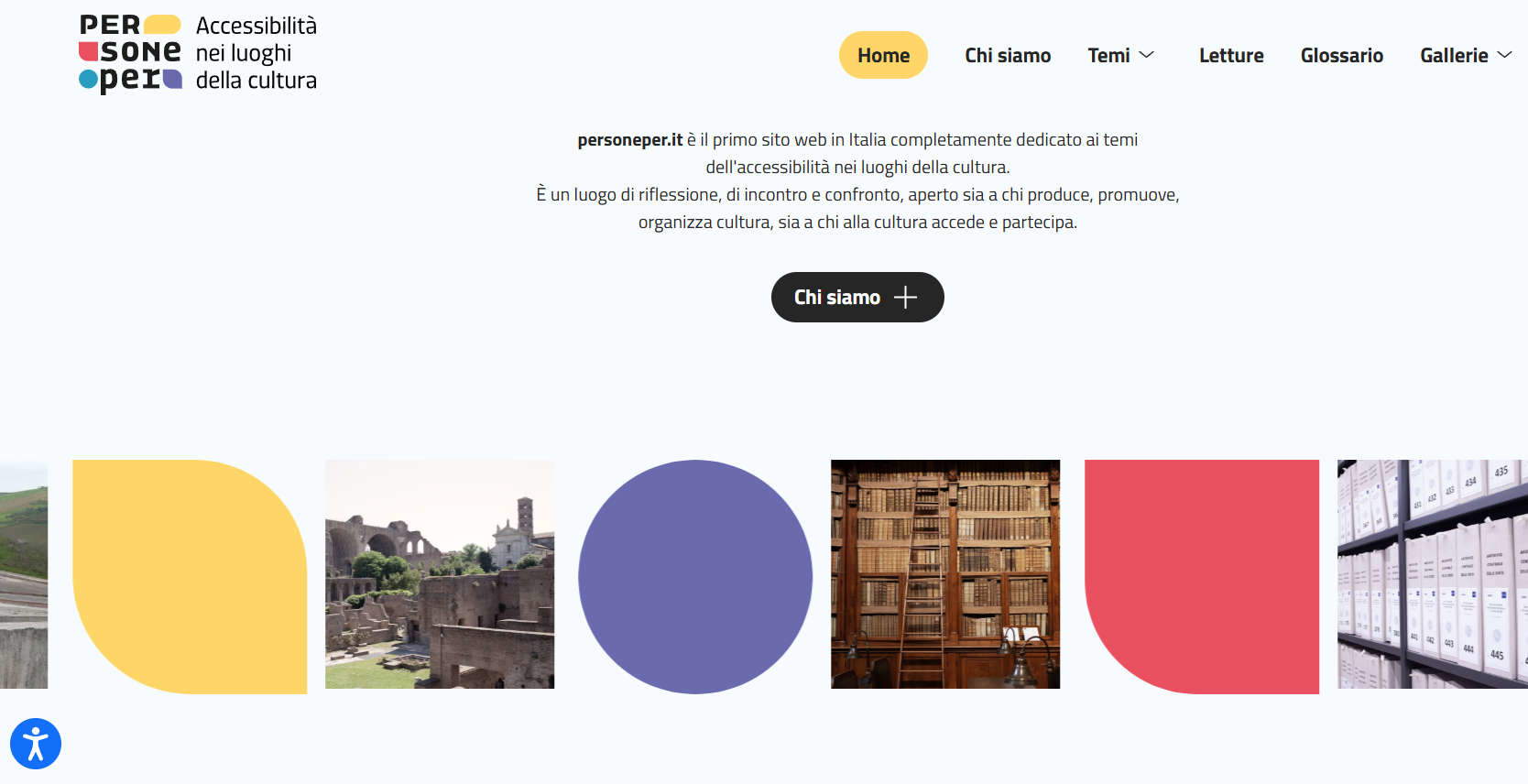A new digital tool to make cultural places more open, accessible and inclusive. It is called personeper.it and is the website just launched by the Ministry of Culture’s General Directorate of Museums together with the National School of Heritage and Cultural Activities. The portal was created as a space for information, training and discussion on the topic ofaccessibility, with the aim of promoting an increasingly conscious and shared approach to inclusion in the cultural world.
The platform, presented as a continuously updated environment, aims to collect experiences, tools and good practices related to the reduction of physical, sensory and cognitive barriers that still hinder the full enjoyment of heritage. In line with the strategies of the National Recovery and Resilience Plan - Culture 4.0, the project is part of the broader program Peopleper. Accessibility in cultural places, which aims to provide specific skills and knowledge to those working in museums, libraries, archives and archaeological parks.
The goal is to build a true culture of accessibility that goes beyond the logic of technical intervention to embrace an integrated and participatory vision. In this perspective, personeper.it becomes not only an archive of resources, but a space for dialogue and exchange, in which cultural operators, scholars and citizens can discuss experiences, languages and tools capable of making culture more equitable and shared.

The site is divided into several sections, designed to accompany the user on a path of progressive knowledge. The “Readings” blog collects reflections, stories, testimonies and news signed by experts and educators, offering a constantly updated observatory on accessibility practices in Italy and abroad. It is not just a review of articles, but a place to bring out different perspectives on how to experience and design cultural places.
Another prominent section is the Glossary, an innovative tool that combines text, images, video, and sound to tell the meaning of key words related to accessibility. Here the concepts are not only explained in theoretical form, but illustrated through examples and multimedia materials, with the intention of making the terminology more accessible even to those approaching the subject for the first time.
Added to these areas is theDownload Area, which allows users to consult documents, standards, guidelines and publications, facilitating orientation among legislative and operational references. There is also a Photo Gallery - soon to be published - that will offer a visual look at the many forms of relationships between people and cultural spaces, and a series of podcasts, currently in production, designed as “audio journeys” into the world of accessibility and heritage.
The organization of the content follows three basic directions: reception, experience, and participation. Reception concerns the preparation of operators and the quality of communication, from the museums’ website to direct interaction with visitors. Experience, on the other hand, focuses on multi-sensory and relational enjoyment of cultural heritage, moving beyond a merely cognitive approach. Finally, participation paves the way for collaborative models and co-design processes that actively involve local communities, promoting a shared and collective idea of culture.
In this vision, personeper.it becomes a platform that puts the dialogue between the public’s point of view and that of the operator at the center. Archives, libraries, museums and archaeological parks are narrated as living organisms, capable of welcoming diversity and valuing differences. The goal is to make every place of culture a truly open space, where people can recognize themselves, participate and actively contribute to the construction of the collective sense of heritage.
The project is part of the broader NRP Culture 4.0 investment dedicated to “Removing physical and cognitive barriers in museums, libraries and archives to enable wider access and participation in culture.” Funded by the European Union-NextGenerationEU, Personeper represents Action Line 7 of the measure “Cultural Heritage for the Next Generation,” and is distinguished by its systemic and formative approach.
The General Directorate of Museums of the Ministry of Culture is the implementing party of the project, while the content and implementation of the site are entrusted to the National School of Heritage and Cultural Activities, which for years has been promoting high-level training programs for professionals in the field. The collaboration between the two institutions confirms the desire to make the issue of accessibility structural within Italian cultural policies.
In the European context, personeper.it is positioned as a pioneering initiative. Few other countries have developed public platforms entirely dedicated to collecting, sharing and promoting cultural accessibility practices in a systematic way. The site thus becomes a reference point for all those working in the field, offering useful tools for designing truly inclusive spaces, routes and services.
Through accessible content, multimedia materials and constantly evolving sections, the portal aims to stimulate a collective reflection on how culture can become a meeting ground, overcoming barriers that are not only physical, but also cognitive and symbolic. Each section is designed to foster mutual understanding and support the daily work of those in cultural venues who are committed to ensuring the right of access for all.
The launch of personeper.it is thus an important step toward building a more open, equitable and participatory cultural ecosystem. The platform does not just disseminate good practices, but promotes a broader cultural transformation in which accessibility is not an additional service, but an essential condition of the quality of cultural offerings.
Information and updates on upcoming content-including the release of the photo gallery and the launch of the podcast dedicated to accessibility-can be found at www.personeper.it or write to the editorial team at redazione.personeper@fondazionescuolapatrimonio.it.
 |
| Peopleper.it, the Ministry of Culture's pioneering platform on accessibility, is born |
Warning: the translation into English of the original Italian article was created using automatic tools. We undertake to review all articles, but we do not guarantee the total absence of inaccuracies in the translation due to the program. You can find the original by clicking on the ITA button. If you find any mistake,please contact us.